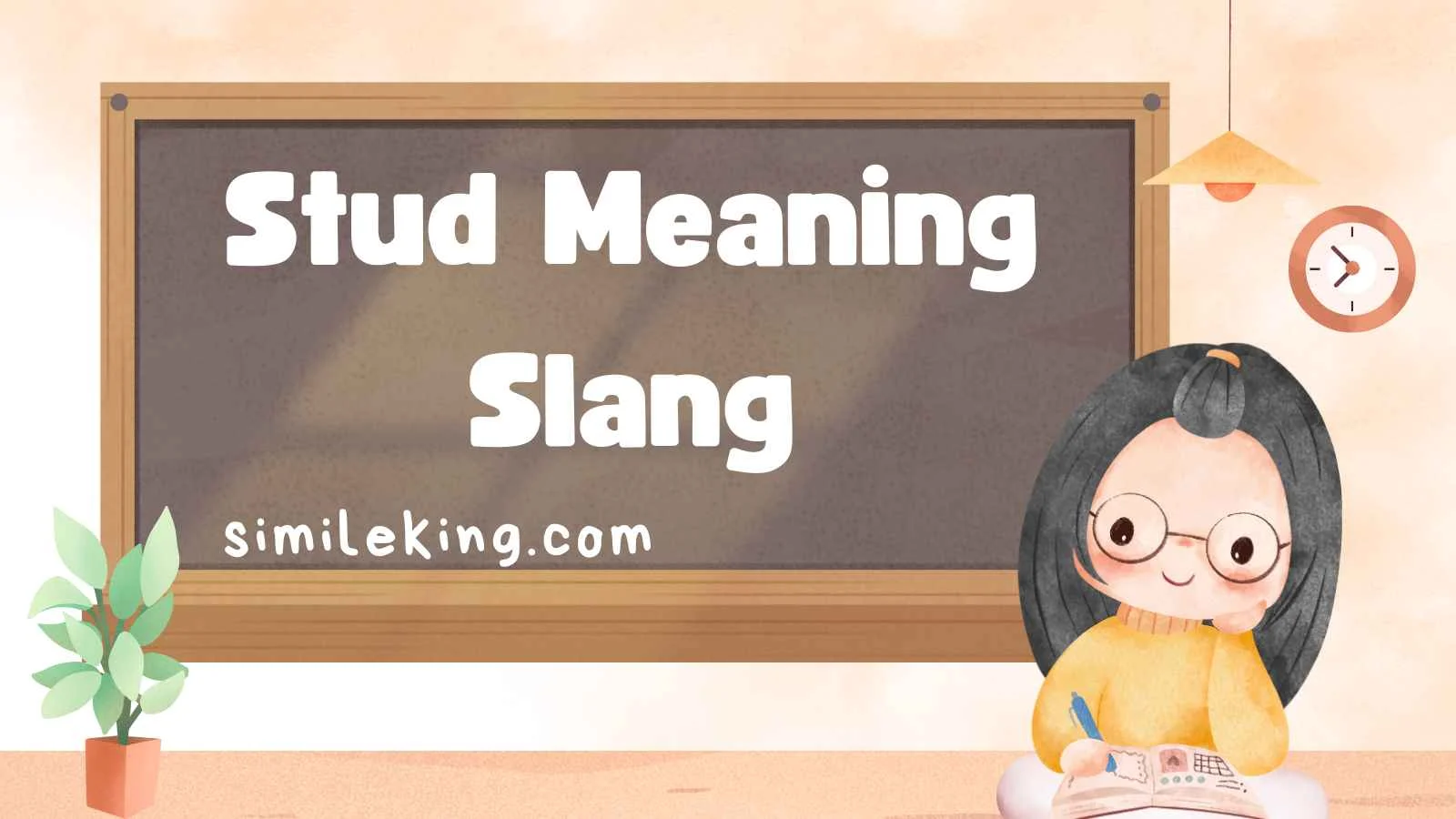Slang is one of the most fascinating aspects of the English language. It evolves constantly, reshaping the way people communicate across generations, cultures, and even digital platforms. One of the most intriguing slang words that has carried multiple connotations over time is “stud.”
In 2025, “stud” continues to appear in text messages, social media captions, workplace banter, and casual conversations. But its meaning shifts depending on context, tone, and the people involved in the interaction. While some use it as a compliment, others interpret it differently—sometimes humorously, sometimes critically.
This article takes a deep dive into the slang meaning of “stud”—its origins, definitions, nuances, and how it is understood in 2025. We’ll also look at alternatives for situations where slang might not feel appropriate, especially in professional or polite communication.
By the end, you’ll have a complete, advanced-level understanding of “stud” and its variations, as well as 10 polished alternatives that can help you communicate with confidence across different settings.
The Core Meaning of “Stud” in Slang
At its root, the slang word “stud” refers to an attractive, confident, and desirable person—typically a man.
Traditionally, the term came from animal breeding, where a “stud horse” or “stud bull” referred to a male animal prized for its strength, virility, and ability to produce offspring. Over time, this concept was applied metaphorically to humans, particularly men seen as:
- Physically attractive (muscular, athletic, stylish).
- Sexually desirable (linked to charm, confidence, or masculinity).
- Socially dominant (popular, admired, or envied in their circle).
For example:
- “He’s such a stud—look at him with that leather jacket.”
- “Did you see how he handled that? Total stud moment.”
How the Meaning of “Stud” Evolved
Language evolves with culture, and “stud” has taken on new shades of meaning in 2025 that weren’t as visible in earlier decades. Let’s break down the main contexts where the slang is used:
1. Compliment for Attractiveness
Still the most common usage, where “stud” simply means someone looks good or carries themselves in an appealing way.
- “Wow, you look like a stud in that suit.”
2. Acknowledging Confidence
Not limited to appearance, “stud” also applies to people who show charisma or bravery.
- “She nailed that presentation—total stud energy.”
3. Gender-Neutral Expansion
Although traditionally applied to men, younger generations in 2025 use “stud” more loosely—even as a gender-neutral compliment. Some women proudly call themselves “studs,” flipping the old male-centric usage.
- “She’s a stud on the soccer field.”
4. Playful or Ironic Use
Sometimes “stud” is used jokingly, especially among friends.
- “Yeah, right—you tripped on the stairs, real stud move.”
5. Flirtatious Undertone
In texting or dating contexts, calling someone a “stud” adds flirtatious weight.
- “Hey stud 😉 what are you up to?”
Is “Stud” Always Positive?
While “stud” is mostly positive, tone and context matter. Used the wrong way, it can feel:
- Objectifying → reducing someone to their looks.
- Overly casual → sounding inappropriate in professional settings.
- Outdated → for some, “stud” feels like a word stuck in the 80s or 90s.
That’s why knowing when and how to use it—or replace it—is essential.
When to Use “Stud” vs. When to Avoid It
Use “stud” when:
- You’re in a casual, friendly, or playful context.
- You’re texting friends, joking in group chats, or posting on social media.
- The person you’re addressing is comfortable with slang.
Avoid “stud” when:
- You’re in a professional or workplace setting.
- You’re unsure if the term might be taken as objectifying.
- You want to express admiration in a more respectful or polished tone.
Why Alternatives to “Stud” Matter
In modern communication, people move fluidly between contexts—sometimes you’re in a casual chat, other times you’re drafting a LinkedIn post. A word like “stud” might work in one place but come across as awkward or unprofessional in another.
That’s why it’s important to know alternatives that capture the positive essence of the compliment while fitting the tone of the situation.
10 Alternatives to “Stud” (With Nuance and Examples)
Here are ten powerful alternatives you can use instead of “stud,” depending on whether you want to sound polite, professional, or casual:
1. Charismatic
- Tone: Professional, polished.
- Why it works: Highlights personality and charm without sounding objectifying.
- Example: “He’s such a charismatic speaker—everyone was engaged.”
2. Distinguished
- Tone: Formal, respectful.
- Why it works: Great for mature admiration, often linked to professional or elegant settings.
- Example: “You looked very distinguished at the awards dinner.”
3. Magnetic
- Tone: Neutral, versatile.
- Why it works: Suggests a powerful, attractive presence without being limited to physical looks.
- Example: “Her magnetic energy draws people in immediately.”
4. Sharp
- Tone: Semi-professional, casual.
- Why it works: Works for both style and intellect. Compliment without being overly romantic.
- Example: “You look sharp in that new blazer.”
5. Impressive
- Tone: Universal.
- Why it works: Works in nearly every context—academic, workplace, casual, or personal.
- Example: “That was an impressive performance.”
6. Charming
- Tone: Warm, polite, slightly romantic.
- Why it works: A timeless alternative that compliments personality, not just appearance.
- Example: “You were so charming at dinner tonight.”
7. Dashing
- Tone: Polished, slightly old-fashioned elegance.
- Why it works: Adds a sense of sophistication, often for physical appearance.
- Example: “He looked dashing in his tuxedo.”
8. Commanding
- Tone: Strong, professional.
- Why it works: Compliments presence, leadership, and influence.
- Example: “She has a commanding stage presence.”
9. Polished
- Tone: Professional, respectful.
- Why it works: Highlights refinement and care in appearance or behavior.
- Example: “Your presentation was polished and engaging.”
10. Confident
- Tone: Universal, professional, casual, or personal.
- Why it works: Complimenting confidence is powerful and avoids objectification.
- Example: “You walked into that meeting so confident—it set the tone.”
How to Choose the Best Alternative
When selecting a word to replace “stud,” consider three key factors:
- Audience: Who are you talking to? A friend, coworker, or someone in authority?
- Setting: Is it professional, casual, romantic, or social media?
- Tone: Do you want the compliment to be lighthearted, respectful, or formal?
For example:
- Talking to your boss → “distinguished” or “polished.”
- Talking to a close friend → “sharp” or “magnetic.”
- Talking in a romantic context → “charming” or “dashing.”
Final Thoughts
The slang word “stud” carries a long history—from breeding terminology to being one of the most common compliments for attractiveness and confidence. In 2025, its usage has become more inclusive, playful, and versatile, though it still carries contexts where it might feel inappropriate.
By understanding its nuances and having ten refined alternatives at your disposal, you can navigate different conversations—whether they’re professional, casual, or flirtatious—without worrying about tone mismatches.
Language is not static. Every word, especially slang, comes alive in the way we choose it, shape it, and share it. Knowing when to call someone a “stud” and when to switch to “charismatic,” “distinguished,” or “confident” gives you linguistic flexibility and cultural awareness.
That’s how you move from simply using words to mastering them.





